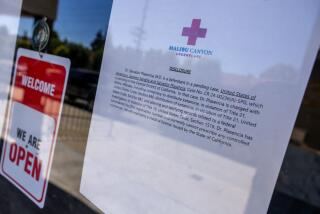Doctors tried to turn in one of their own
- Share via
Dr. Julio Diaz, a general practitioner, was well known in Santa Barbara -- to addicts and fellow physicians.
According to court records, physicians in the community and the parents of patients hooked on pills complained to the Medical Board of California for years that Diaz was recklessly prescribing drugs.
But Diaz was not stopped until this year--after 17 of his patients had died of overdoses or related causes, coroner’s records show.
One doctor at Santa Barbara Cottage Hospital said he had sent the medical board letters about Diaz starting in 2005 or earlier. Another physician compiled a list of incidents in which Diaz’s patients were treated for drug intoxication in the emergency room: 410 times in a two-year period, court records show.
“We see at least one patient a month who is admitted for detoxification from excessively high doses of narcotics after seeing Dr. Diaz,” three doctors and a nurse wrote to the board on Oct. 26, 2009. “He is often described as a ‘doctor you can get anything from’ by patients...”
“We have previously raised concerns with the medical board regarding Dr. Diaz’s prescribing practices but are corresponding again because we continue to see patients who have become addicted under his care.”
By then, 13 of Diaz’s patients had died. Four more would die over the next two years.
In September 2010, according to court records, a medical board investigator made a surprise visit to Diaz’s office to look into a mother’s complaint that he had turned her daughter into an addict -- an allegation he denied.
An expert for the board reviewed Diaz’s treatment of the daughter and found nothing wrong, court records state. The board took no action.
Records do not indicate how the agency responded to the earlier complaints about Diaz.
In January, federal agents arrested Diaz on charges of drug trafficking. He pleaded not guilty and is awaiting trial. Two months later, the medical board accused him of excessive prescribing to one patient. The board revoked his license after he failed to respond to the accusation.
Diaz, 64, said in an interview that many patients came to him already addicted. “If you don’t give them the medications, they are going to go to the street to get it,” he said. Asked if he felt responsible for any of the overdose deaths, Diaz said: “Oh, I do feel responsible. I was the one providing the medications.”
The toll could easily have been higher, he added. Diaz said he took precautions such as requiring patients to sign contracts promising not to overuse painkillers and dismissing patients he believed were addicts.
“By not prescribing to people that are not honest, maybe we avoided another 20 or 30 cases of death,” he said.
More to Read
Sign up for Essential California
The most important California stories and recommendations in your inbox every morning.
You may occasionally receive promotional content from the Los Angeles Times.











